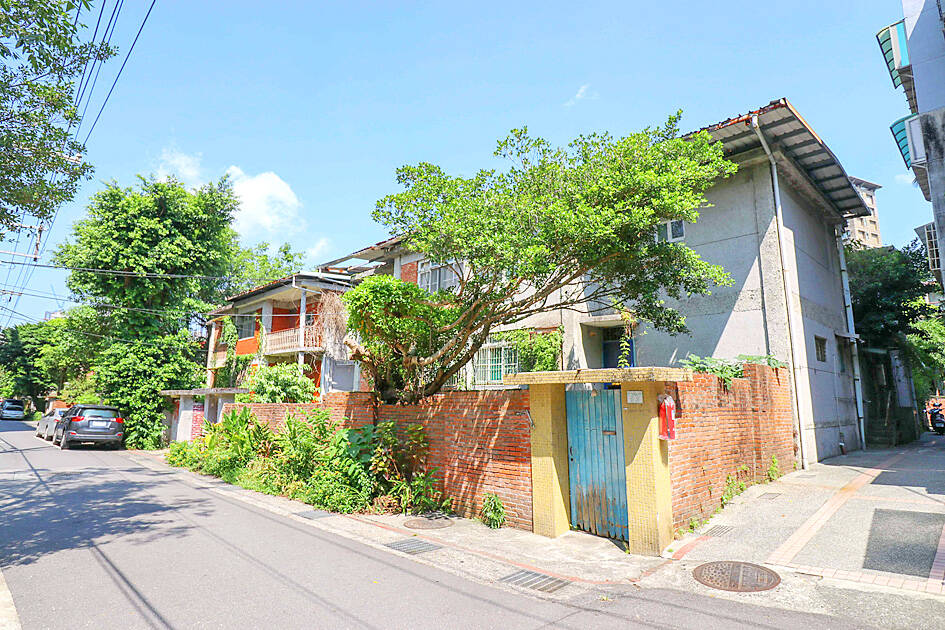National Chengchi University (NCCU) has opened a co-ed dormitory, a first in Taiwan among state-funded Taiwan universities.
The 22 duplexes are at the renovated “Huanan New Village,” in Taipei City’s Mucha (木柵) area, near the NCCU campus, a school official said yesterday.
Twenty-two out of 37 group applications were selected in a lottery draw to select who would be chosen to live in the units, which can either be shared by up to eight students if the unit has four bedrooms, or up to 10 students if it is a five-bedroom unit, officials said.

Photo courtesy of the school
Completed in 1964 for campus staff housing, the “Huanan” residence has since undergone renovation and cultural preservation work in recent years, with NCCU now allowing male and female co-habitation, and each unit is provided with beds, tables, chairs, a refrigerator and a washing machine, officials said.
The units are reasonably priced, as the total monthly rent ranges between NT$20,000 to NT$25,000 for groups of up to 10 students per house, and the cost for each student is only about NT$2,500 per month for a school term duration, officials said.
In other related news, a recent survey conducted by the Professor Huang Kun-huei Education Foundation found that Taiwanese are in favor of abolishing gender segregation at high schools, endorsing boys and girls to be taught together in classrooms during their teenage years.
Nearly all top high schools across Taiwan are unisex, said professor of education Kuo Sheng-yu (郭生玉) who headed up the survey.
“This school segregation by gender is like ‘Apartheid’ for students, It is a severe violation of the human character,” Kuo said last week.
“During a student’s teenage years, attending high school is the most critical stage for getting to know the opposite sex. The schools should not be segregated, and boys and girls should learn together in classrooms,” he added.
Survey results showed Taiwanese have more progressive concepts on gender issues, with 80 percent saying they would encourage children to challenge traditional gender roles, so that they are less restricted by norms when pursuing personal interests and professional careers, foundation director Huang Kun-huei (黃昆輝) said.
Nearly 70 percent agreed that society has changed, he said, adding that Taiwan’s traditionally male-centered mindset has diminished.

The Ministry of Economic Affairs has fined Taobao NT$1.2 million (US$36,912) for advertisements that exceed its approved business scope, requiring the Chinese e-commerce platform to make corrections in the first half of this year or its license may be revoked. Lawmakers have called for stricter enforcement of Chinese e-commerce platforms and measures to prevent China from laundering its goods through Taiwan in response to US President Donald Trump’s heavy tariffs on China. The Legislative Yuan’s Finance Committee met today to discuss policies to prevent China from dumping goods in Taiwan, inviting government agencies to report. Democratic Progressive Party Legislator Kuo Kuo-wen (郭國文) said

The Ministry of Economic Affairs has fined Taobao NT$1.2 million (US$36,900) for advertisements that exceeded its approved business scope and ordered the Chinese e-commerce platform to make corrections in the first half of this year or its license would be revoked. Lawmakers have called for stricter supervision of Chinese e-commerce platforms and more stringent measures to prevent China from laundering its goods through Taiwan as US President Donald Trump’s administration cracks down on origin laundering. The legislature’s Finance Committee yesterday met to discuss policies to prevent China from dumping goods in Taiwan, inviting government agencies to report on the matter. Democratic Progressive Party

Taiwan and its Pacific ally Tuvalu on Tuesday signed two accords aimed at facilitating bilateral cooperation on labor affairs, according to Taiwan’s Ministry of Foreign Affairs (MOFA). The governments inked two agreements in Taipei, witnessed by Foreign Minister Lin Chia-lung (林佳龍) and visiting Deputy Tuvaluan Prime Minister Panapasi Nelesone, MOFA said in a news release. According to MOFA, the agreements will facilitate cooperation on labor issues and allow the two sides to mutually recognize seafarers’ certificates and related training. Taiwan would also continue to collaborate with Tuvalu across various fields to promote economic prosperity as well as the well-being of their

Sung Chien-liang (宋建樑), who led efforts to recall Democratic Progressive Party (DPP) Legislator Lee Kun-cheng (李坤城), was released on bail of NT$80,000 today amid outcry over his decision to wear a Nazi armband to questioning the night before. Sung arrived at the New Taipei District Prosecutors’ Office for questioning in a recall petition forgery case last night wearing a red armband bearing a swastika, carrying a copy of Adolf Hitler’s Mein Kampf and giving a Nazi salute. Sung left the building at 1:15am without the armband and covering the book with his coat. Lee said today that this is a serious